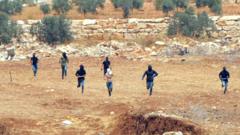The proposed peace deal, mediated by the US and Qatar, encompasses provisions for disarmament and a joint security mechanism, as both nations prepare for a formal signing next week.
Rwanda and DR Congo Reach Draft Peace Accord to Address Long-standing Conflict

Rwanda and DR Congo Reach Draft Peace Accord to Address Long-standing Conflict
Officials from Rwanda and the Democratic Republic of Congo have formulated a draft agreement aimed at resolving decades of violence in the region.
In a significant diplomatic development, representatives from Rwanda and the Democratic Republic of Congo (DR Congo) have agreed on a draft peace accord to potentially end years of conflict in the region. The agreement, facilitated by the United States and Qatar, outlines strategies for the “disengagement, disarmament, and conditional integration” of armed factions that have long rattled the eastern parts of DR Congo.
Despite ongoing allegations of support for the M23 rebel group—a faction that has notably captured considerable territory this year—Rwanda has firmly rejected claims of its military engagement in the conflict. The peace deal aims to establish a joint security framework intended to avert future violent confrontations. If all goes as planned, the formal signing of this agreement is anticipated to take place next week.
The peace negotiations, backed by the US State Department, followed three days of dialogue focused on shared political, security, and economic concerns between the two countries’ officials in Washington. This latest draft builds on earlier commitments made in April, where both nations agreed to respect each other's sovereignty and to develop a peace framework promptly.
As the M23 rebels persist in asserting control over vital resources in the mineral-rich eastern region, analysts express uncertainty over several aspects of the draft resolution. Among the lingering questions are the status of the M23’s territorial claims, the potential acknowledgment of Rwandan military presence, processes for refugee return, and the mechanics of disarming both the M23 and other factions like the FDLR.
Historical precedents reveal a pattern of peace agreements failing to materialize, raising skepticism about the durability of this fresh accord. Previous attempts have faltered despite agreements reached under Angolan mediation in 2022, failed to gain ministerial support, leading to broader diplomatic implications.
Additionally, Kinshasa's overtures to the US for military assistance come as it grapples with the urgent need to stabilize its control over areas rich in strategic minerals—from coltan essential for electronics to other crucial resources.
With the eyes of the international community focused on this pivotal agreement, many await the formal signing ceremony and hope for a lasting resolution to the turmoil that has plagued the region for far too long.






















